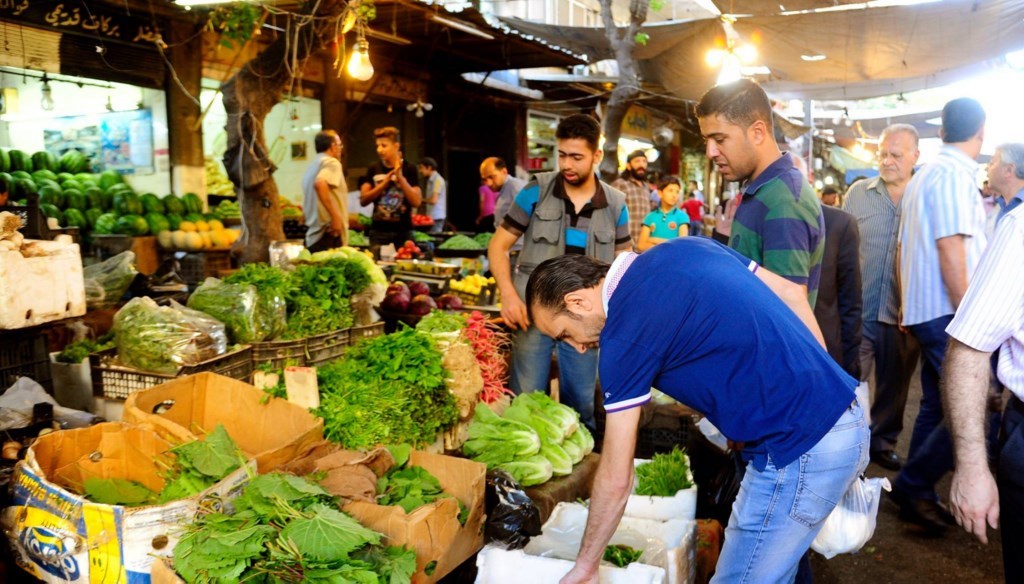The markets of Idleb have seen an increase in the prices of most products, especially imports and those exchanged between all of Syria’s regions, reflecting negatively on the living situation for many residents.
Bilal Zeiden, owner of a vegetable shop in the al-Hal Market in the city of Saraqeb told Zeitoun: “Most types of vegetables and fruits which are not available in our area are brought in a commercial exchange process with traders in the regime areas, which is a (bartering) process between them and us — that is, exchanging goods for others that are not available for one of the two sides. For example in some cases types of foods like flour are sent in exchange for types of fruits or vegetables that are not available in our area.”
Zeiden attributed the rise in prices in the province’s markets to the bargaining method and its effects, saying that “during the exchange process, the regime imposes a tax on the cars called an ‘accompaniment,’ whereby the cars are accompanied to the borders of the liberated areas to protect the driver’s safety. This tax is very costly, reaching up to 150,000 Syrian pounds for small cars and up to 900,000 pounds for large trucks. It is paid between us and the trader at the source and vice versa. There are also some types of vegetables like carrots and potatoes which we import from Turkey and their prices are a little higher than the market prices.”
With regards to the differences in the prices of goods from one shop to another within the same market, he said: “The reason for this is the difference in the sources, whereby the traders whom we import goods from compete among one another in order to take their place in the market. So for example, the price of a carton of bananas was 6,000 pounds yesterday, then it went down today to 5,000 pounds. This is a big drop in the price in such a short time, which is evidence of the competition among traders who export the goods to our area. It’s also an indication of the extent of their contribution to the differences in prices between stores in our areas.”
The vegetable seller in the Saraqeb market Abdullah Kafrtona said that the reason for the disparity in prices within the al-Hal Market and the main market was the cost of additional transport from al-Hal to the main market, in addition to the cost of spoilage in the vegetables as a result of transporting them another time. He also pointed to the damage inflicted on vegetable sellers by heavy bombardment, whether through shelling on the markets themselves, or the displacement of people and clearing the city, which leads to a recession of goods.
Mohamed Darwish, one of the city’s residents, said: “The prices of vegetables and fruits are very high, and the vegetable sellers claim the reason is the increase in the exchange rate of the dollar in light of the complete absence of any regulation of the prices, which makes the prices subject to the moods of the traders. In addition, some vegetables are irrigated with polluted water, which could cause serious diseases. We hope that the responsible bodies will form a committee to monitor and control the prices to something appropriate for everyone.”
He added that “Because food items, vegetables and fruits have become calculated based on the dollar, this has had a negative impact, in addition to the difficulties and dangers of transport, the shutting of roads between the liberated areas and regime-controlled areas. It is well known that the transport is done through large cars from port areas in Lattakia or from Damascus to our areas, especially citrus, bananas, and cucumbers, meaning everything that is not available in the liberated areas. Regarding what we do have, the prices of most items are high, and especially with the rainfall, there are some traders who exploit this and monopolize them by storing them in private warehouses, like potatoes, which are hard to uproot during the rain, and then sell them at high prices. Some others irrigate their land with polluted water, to save irrigation expenses and diesel.”
This article was translated and edited by The Syrian Observer. Responsibility for the information and views set out in this article lies entirely with the author.


